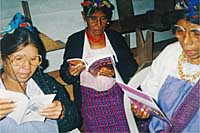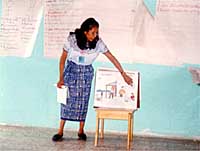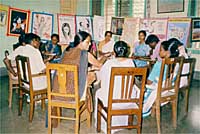A wide variety of tools was used in promoting the March and its demands. Apart from the Advocacy Guide to Women's World Demands, Québec women put together a workshop guide to explore in depth a particular subject or demand using different forms of expression: letters, collages, comic strips, lunchtime discussions, role playing, posters and banners.
Many groups organized workshops on the rights of women, health, poverty and precariousness, and violence (Australia, Brazil, Cuba, Gabon, India, Jordan, Martinique, Mexico, Portugal, Sweden, Thailand, etc.).
Some 50 countries came up with official slogans, but there were many unofficial ones to be seen on demonstrations, of course. Creativity was the order of the day in posters announcing national marches and in the designs of support cards.
 |
Indigenous women in Guatemala read the March Advocacy Guide to Women's World Demands. |
Workshop held for youngsters in Guatemala in July 2000. |
 |
Statistics with a gender
Thanks to the March, data were gathered on the situation of women that do not appear in countries' official statistics.
The national reports discussed data on the position occupied by women in the economy (percentage of women working, unemployed, state of occupational training, number of women who own land) and in education (women's literacy rate, degree of schooling). The reports spoke of the state of the health system (existence of health centres meeting women's basic and specific needs, delivery of care during pregnancy, importance of the AIDS epidemic, degree of contraception, abortion rate) and violence experienced by women and whether help is available to them (legal mechanisms and police services, shelters for battered women). Other topics discussed in the reports were the situation of immigrant women and elderly women, women's participation in politics, and the place of women as seen in legislation in effect.
Many groups demanded that their governments provide funds for research into the situation of women in their respective countries, particularly on the questions of violence against women and the contribution of women's informal work to the economy.







